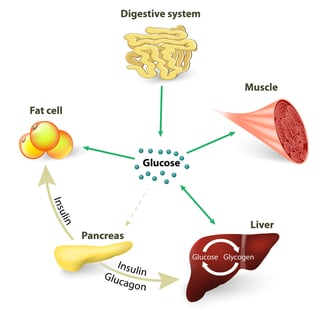Understanding the Glycemic Index and Natural Diabetes Control
Type II Diabetes Mellitus, also known as adult-onset diabetes (though more and more juveniles are now developing diabetes) is a significant public health concern in the United States, and a significant personal health concern for those suffering from the disease. Improperly managed diabetes can lead to heart disease, kidney disease, and a variety of other serious and potentially deadly problems.
In Type I diabetes, the pancreas doesn't produce enough insulin—a hormone that plays a vital role in metabolism and controlling blood sugar. This type of diabetes typically appears early in life, often around puberty,  and is caused by an underlying genetic issue. Type II diabetes, on the other hand, occurs when the body's insulin receptors lose their sensitivity and stop responding to insulin. While there may be genetic factors that can influence a person's likelihood of developing Type II diabetes, nutrition and lifestyle seem to be much bigger influences.
and is caused by an underlying genetic issue. Type II diabetes, on the other hand, occurs when the body's insulin receptors lose their sensitivity and stop responding to insulin. While there may be genetic factors that can influence a person's likelihood of developing Type II diabetes, nutrition and lifestyle seem to be much bigger influences.
Understanding proper nutrition can help you prevent, control, and possibly even reverse Type II diabetes. And one of the keys to this understanding is the glycemic index.
Different Foods Have Different Effects on Insulin Levels
While the exact mechanisms behind reduced insulin sensitivity and the development of Type II diabetes are quite complex and still being studied, we do know that sudden spikes and drops in insulin levels appear to contribute to the problem. After years of spikes and drops, insulin receptors simply stop responding to changes. And that's a big problem.
Insulin's job is to take glucose from your bloodstream and feed it to you body's cells for energy. Glucose is simply sugar; your body turns virtually all carbohydrates you eat into glucose, and it is then carried by your blood stream throughout your body.
When your body senses glucose coming from your digestive tract, it releases insulin so the glucose can get used up (or stored as fat when it isn't needed right away). Fiber and fat in the foods you eat, on the other hand, don't cause an insulin response. A meal that contains a high ratio of glucose to fibers and fats will trigger a larger and more sudden response than a meal that is lower in glucose or that has a higher amount of fiber and/or fat.
The glycemic index is a way to measure the proportion of glucose in a given food item or meal. More accurately, it measures how any given food item/meal will affect your blood sugar. The end result is the same: foods with a higher glycemic index will cause a bigger spike in your blood sugar and thus your insulin level compared to foods lower on the index. The closer food is to pure glucose (100 on the glycemic index), the more dangerous it is from a diabetes perspective.
Using the Glycemic Index to Your Dietary Advantage
This doesn't mean you need to cut carbohydrates out of your diet completely. It does mean that refined carbohydrates such as white sugar, white flour, processed corn products and the like are worse for you than more complex carbohydrates still in their natural state. It also means that you should pair carbohydrates with foods that are low on the glycemic index and have very little or no effect on insulin levels: primarily fiber and healthy fats. Keep in mind that protein causes an insulin response,and a mild rise in blood sugar.
There's more to healthy eating than avoiding refined carbohydrates, of course. You can check out other tips here on our blog, and be sure to stay in touch for more natural ways to restore and maintain your health. For a customized plan click on the link below.

















